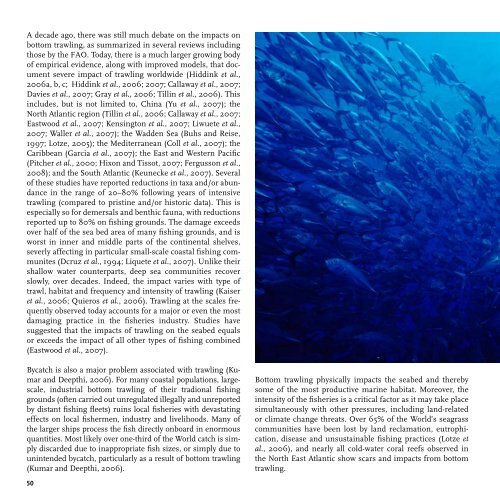In Dead Water: Merging of climate change with - UNEP
In Dead Water: Merging of climate change with - UNEP
In Dead Water: Merging of climate change with - UNEP
You also want an ePaper? Increase the reach of your titles
YUMPU automatically turns print PDFs into web optimized ePapers that Google loves.
A decade ago, there was still much debate on the impacts on<br />
bottom trawling, as summarized in several reviews including<br />
those by the FAO. Today, there is a much larger growing body<br />
<strong>of</strong> empirical evidence, along <strong>with</strong> improved models, that document<br />
severe impact <strong>of</strong> trawling worldwide (Hiddink et al.,<br />
2006a, b, c; Hiddink et al., 2006; 2007; Callaway et al., 2007;<br />
Davies et al., 2007; Gray et al., 2006; Tillin et al., 2006). This<br />
includes, but is not limited to, China (Yu et al., 2007); the<br />
North Atlantic region (Tillin et al., 2006; Callaway et al., 2007;<br />
Eastwood et al., 2007; Kensington et al., 2007; Liwuete et al.,<br />
2007; Waller et al., 2007); the Wadden Sea (Buhs and Reise,<br />
1997; Lotze, 2005); the Mediterranean (Coll et al., 2007); the<br />
Caribbean (Garcia et al., 2007); the East and Western Pacific<br />
(Pitcher et al., 2000; Hixon and Tissot, 2007; Fergusson et al.,<br />
2008); and the South Atlantic (Keunecke et al., 2007). Several<br />
<strong>of</strong> these studies have reported reductions in taxa and/or abundance<br />
in the range <strong>of</strong> 20–80% following years <strong>of</strong> intensive<br />
trawling (compared to pristine and/or historic data). This is<br />
especially so for demersals and benthic fauna, <strong>with</strong> reductions<br />
reported up to 80% on fishing grounds. The damage exceeds<br />
over half <strong>of</strong> the sea bed area <strong>of</strong> many fishing grounds, and is<br />
worst in inner and middle parts <strong>of</strong> the continental shelves,<br />
severly affecting in particular small-scale coastal fishing communites<br />
(Dcruz et al., 1994; Liquete et al., 2007). Unlike their<br />
shallow water counterparts, deep sea communities recover<br />
slowly, over decades. <strong>In</strong>deed, the impact varies <strong>with</strong> type <strong>of</strong><br />
trawl, habitat and frequency and intensity <strong>of</strong> trawling (Kaiser<br />
et al., 2006; Quieros et al., 2006). Trawling at the scales frequently<br />
observed today accounts for a major or even the most<br />
damaging practice in the fisheries industry. Studies have<br />
suggested that the impacts <strong>of</strong> trawling on the seabed equals<br />
or exceeds the impact <strong>of</strong> all other types <strong>of</strong> fishing combined<br />
(Eastwood et al., 2007).<br />
Bycatch is also a major problem associated <strong>with</strong> trawling (Kumar<br />
and Deepthi, 2006). For many coastal populations, largescale,<br />
industrial bottom trawling <strong>of</strong> their tradional fishing<br />
grounds (<strong>of</strong>ten carried out unregulated illegally and unreported<br />
by distant fishing fleets) ruins local fisheries <strong>with</strong> devastating<br />
effects on local fishermen, industry and livelihoods. Many <strong>of</strong><br />
the larger ships process the fish directly onboard in enormous<br />
quantities. Most likely over one-third <strong>of</strong> the World catch is simply<br />
discarded due to inappropriate fish sizes, or simply due to<br />
unintended bycatch, particularly as a result <strong>of</strong> bottom trawling<br />
(Kumar and Deepthi, 2006).<br />
0<br />
Bottom trawling physically impacts the seabed and thereby<br />
some <strong>of</strong> the most productive marine habitat. Moreover, the<br />
intensity <strong>of</strong> the fisheries is a critical factor as it may take place<br />
simultaneously <strong>with</strong> other pressures, including land-related<br />
or <strong>climate</strong> <strong>change</strong> threats. Over 65% <strong>of</strong> the World’s seagrass<br />
communities have been lost by land reclamation, eutrophication,<br />
disease and unsustainable fishing practices (Lotze et<br />
al., 2006), and nearly all cold-water coral reefs observed in<br />
the North East Atlantic show scars and impacts from bottom<br />
trawling.

















